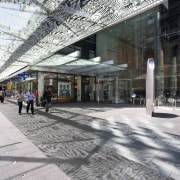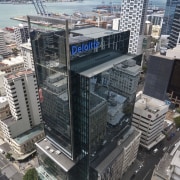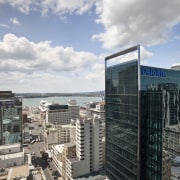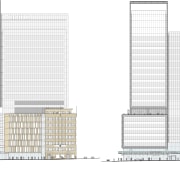the future is now
Environmental technology has been embraced as the way forward for architecture and design ensuring today's buildings have a relevance tomorrow

Forget the boy's-own version of the 21stcentury, with its hover cars and colonies on other planets life in the new millennium is proving to be an entirely different reality. Environmentally sustainable design is being carried out at a micro, rather than macro, level.
The Deloitte Centre is a prime example of this, as many of its ESD initiatives would escape all but the keenest of eyes, says design director Earle Arney of Woods Bagot.
"The Deloitte Centre is a national exemplar of sustainability and was the first high-rise commercial tower in New Zealand to achieve a 5-Star Green Star design accreditation from the New Zealand Green Building Council.
"One of the key strategies for achieving this status is the double-skin facade, which admits ample natural light reducing the need for artificial lighting while working to minimise solar heat gain."
The double-skin facade comprises two separate glass elements separated by a 600mm cavity. As the air between heats up, it is extracted at the top, while inlets at the base draw cooler air in, keeping the surface of the interior facade at a consistent temperature.

"Extensive and detailed modelling of the building facade was undertaken to determine a system that would provide the best balance of light transmission versus heat gain," says Arney.
Adaptive reuse is another example of ways the Deloitte Centre met its sustainability obligations. The centrally located site was home to the Jean Batten Building, completed in 1942. The building was designed by government architect John Mair in the Moderne style later known as Art Deco and named in honour of the aviatrix upon its completion.
"As well as issues relating to sustainability there were aspects of cultural identity and nationalism to acknowledge," says John Coop, director of Warren and Mahoney, partner architects to Woods Bagot for the project. "Extensive consultation with the New Zealand Historic Places Trust and the Auckland City Council heritage architect was undertaken during the design process, which enabled the incorporation of the existing Jean Batten Building facade into the design of the new structure."
With a facade that links the Deloitte Centre to the city's history, the remainder of the building is all about up-to-the-minute technology, says Geoff Wicks, regional director for building contractor Brookfield Multiplex.
"The building is a response to the shortage of premium A-grade commercial property within the CBD, and with that comes a responsibility to position it at the forefront of environmental technology."

Such technology includes smart building control systems that monitor the external environment and can deliver high volumes of fresh air to the building via the variable air volume air-conditioning system. The control systems also monitor the amount of natural light, automatically dimming perimeter lighting when adequate natural light is available.
End-user comfort was also taken into account by ensuring materials such as carpets, paints, sealants and adhesives were low-VOC and that no materials contained formaldehyde.
Says managing director Brookfield Multiplex New Zealand Tim Pope: "The Deloitte Centre is a prime example of Brookfield Multiplex's integrated property model at work. All divisions of our business development, construction, property services, and commercial property contributed to this meritorious outcome."
Credit list
Location
Architects
Structural engineer
Quantity surveyor
Heritage advisor
Facade consultant
Lighting consultant
Traffic consultant
Geotechnical enigneer
Mechanical services
Hydraulic services
Lifts
Demolition and recycling
Insitu concrete
Piling
Profile decking
Render systems
Membrane roofing
Joinery
Carpentry
Metalwork
Developer
Main contractor
Services engineer and acoustic consultant
Contract engineer
Fire engineer
ESD consultant
Lift consultant
Planning consultant
Facade
Electrical services
Fire Services
Glass canopy
Steelwork
Precast concrete
Blockwork
Steel/brass windows
Basement tanking
Glazing
Stonework
Paving
Tiling
Story by: Justin Foote
Home kitchen bathroom commercial design
Sculpted by the wind and sun
Light and refined
Expanded presence













